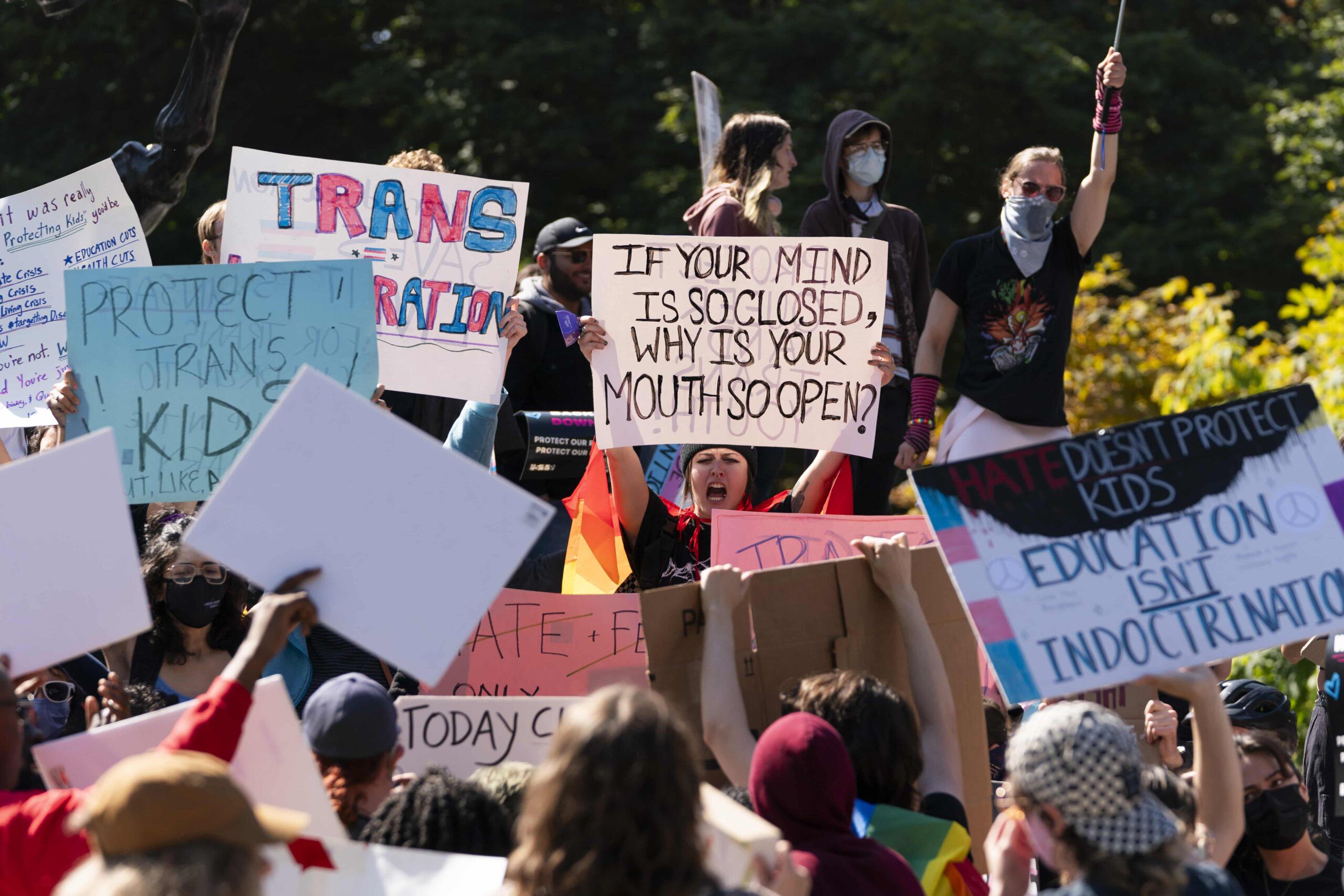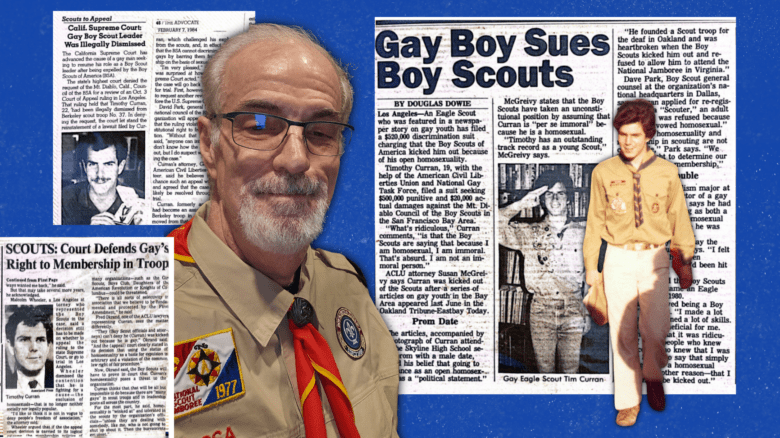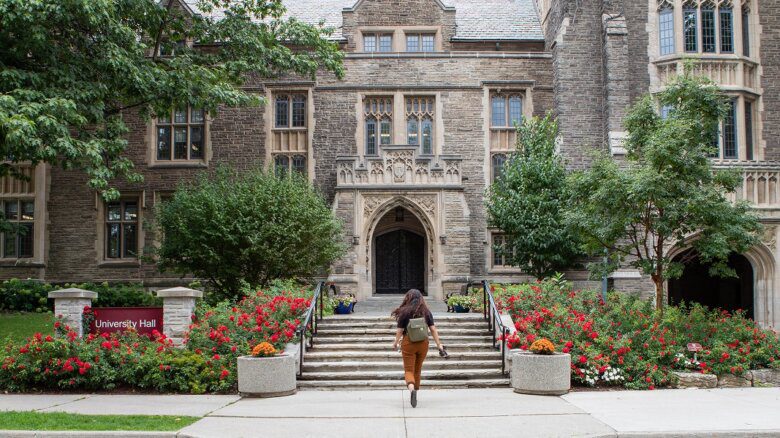On Sept. 20, trans people and their allies mobilized in droves to counter-protest the 1 Million March 4 Children demonstrations taking place all over Canada.
The original protest, mainly coordinated by the groups Family ♥️ Freedom and Hands Off Our Kids, was “advocating for the elimination of the Sexual Orientation and Gender Identity (SOGI) curriculum, pronouns, gender ideology and mixed bathrooms in schools” according to their website. In response, queer and trans activists and organizations across Canada organized over 50 counter-protests to support trans kids and gender-inclusive education in schools. Although anti-trans protestors were generally outnumbered, these protests left many organizers and advocates concerned about the rise in anti-trans hate.
“It was, in fact, a hate campaign, under the guise of protecting children, targeting people who are LGBTQ2S+ and particularly targeting trans youth,” Fareed Khan, founder of Canadians United Against Hate tells Xtra. “This is a danger not only to the kids that they’re targeting with these protests, but it’s a broader danger to Canadians as a whole.”
Sarah Worthman, an organizer of the counter-protest in St. John’s, Newfoundland, corroborated the hateful nature of these protests. She tells Xtra that she identified several white supremacists and neo-Nazis in the crowd, and had even seen people “encouraging their kids to yell the F-slur.” Across Canada, many protestors brought their young children to the protests, with these children often holding up signs reading “I belong to my parents,” among other slogans.
In the days leading up to the protest, Worthman, alongside Montreal trans activist Celeste Trianon, worked to aggregate all the available information about the actions in one place to make it easier to find. They also shared safety tips for attending counter-protests on social media, and offered support to other organizers, for many of whom it was their first time putting on such an action.
In many major cities, including Toronto, anti-trans protestors were vastly outnumbered.
“I think there were about 2,500 people gathered as part of the counter-protests throughout the morning,” says Megan Poole, manager of Community Relations and Communications at The 519, a City of Toronto agency serving the LGBTQ2S+ community and a Toronto counter-protest organizer. “It was really a strong showing of community and allies coming together in order to support the community.”
She says that “the mission of the counter-protest was to surround those folks with joy and love from our community and make sure that [they] understood that we have always existed and we are trying to live authentically as who we are.”
Although counter-protestors also outnumbered the protestors in St. John’s, Worthman still found the turnout concerning, estimating that about 100 anti-trans protestors showed up.
“Because Newfoundland is such a supportive place … it’s rough to see that there are 100 people who were looking to come out and protest against us,” she says.
In Montreal, hundreds of counter-protestors took to the streets, but were eventually outnumbered by anti-trans protestors. According to Trianon, who organized the counter-protest alongside Queer McGill, the police cleared a space for the anti-trans protestors to set up, allowing their numbers to grow.
“Montreal has never been known as a hub for hate,” she says, adding that many trans activists may have underestimated the magnitude of the threat. “I’m scared for what’s to come and scared for huge generations of queer and trans youth and adults who are going to have to deal with this.”
In Edmonton, protests targeted the Alberta Teachers’ Association (ATA) building. ATA president Jason Schilling says that the staff were upset to see the protest going on outside their workplace.
“Having inclusive school policies to make sure that every student feels safe and cared for is something that we believe in, and something that we always stand up for,” he says.
While he saw significantly more protestors than counter-protestors, he believes that many of his colleagues would have come to counter-protest if they were not teaching students at the time. Worthman similarly mentioned that the timing of the protests, a Wednesday morning, made it hard for many people with day jobs to attend the counter-protest.
Additionally, Schilling called out disinformation being spread by protestors, particularly regarding SOGI 1 2 3, an educational resource that anti-trans protestors accuse teachers of using to indoctrinate their children with “gender ideology.” In reality, he says, it’s not part of the curriculum and may not even be used in many schools across the province.
Trianon agrees that part of countering anti-trans hate involves addressing disinformation and recognizing new rhetoric employed to advance anti-trans hate, such as the term “gender ideology,” which she says didn’t even exist two years ago. Khan explains that the language used by contemporary anti-trans advocates, which paints trans people as a danger to children, is the same strategy that has historically been used to demonize other marginalized groups such as Jewish people, Black men and gay men throughout history.
Khan also believes that more needs to be done at the government level to counter transphobic hate.
“We’ve been pushing for years now for the federal government to undertake a nationally coordinated anti-hate strategy properly funded and properly staffed,” he says. “Currently, everything is being done in silos.”
On a more local level, many of the organizers who spoke to Xtra encourage people, especially allies, to challenge hate in their daily lives.
“I think it’s very critical that when hate arises in our community, in our homes, our neighbourhoods and our cities, that we gather in solidarity to rise against it,” says Poole. “Pride is not just June. Pride is every day, and allies need to start and continue to show up to support LGBTQ2S+ communities.”
Worthman also emphasizes the importance of collective care and building strong relationships with one’s neighbours.
In Newfoundland, she says, “we have such an emphasis on knowing your neighbours, on talking to each other, on caring for people on the street if they look lost, or things like that. And I think we need a little bit more of that throughout Canada,” she says. “Because without it, we’re heading down a bit of a dangerous path in this country.”


 Why you can trust Xtra
Why you can trust Xtra


